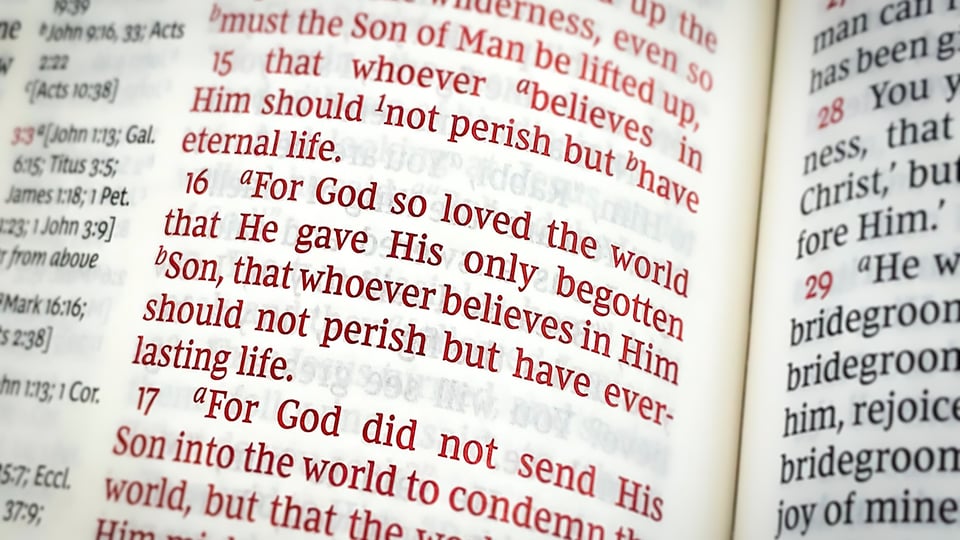What Does John 3:16 Mean? “God So Loved the World”
John 3:16 is quoted often! But what is the meaning of John 3:16? Let’s examine this important verse for what it teaches us about God and His plan.

What does John 3:16 say?
“For God so loved the world that He gave His only begotten Son, that whoever believes in Him should not perish but have everlasting life.”
The power of this verse is in its meaning, not in its display somewhere as a commonplace slogan.
So how do we explain John 3:16?
John 3:16 summarizes one of the most foundational beliefs of Christianity: that God willingly sacrificed His own Son to save the world. Every true Christian should have a deep understanding of the meaning and power of this verse.
John 3:16 explained
Let’s break down John 3:16 phrase by phrase in order to grasp what it truly says.
“For God so loved the world”
These six introductory words identify the force that drives God’s plan forward: God’s incalculable, insurmountable and unquestionable love for humans that He created in His own image (Genesis 1:27).
Consider this: God’s love is so unimaginably great that the apostle John was inspired to write, “God is love” (1 John 4:8).
John did not say “God loves” or “God has love”—but that God is love. That is, He is defined by love. He is composed of love. It’s His very essence. His every thought, word and action is driven by pure, untainted love. That is the God we serve!
The Greek word translated “world” in John 3:16 is kosmos, which, according to Thayer’s Greek Lexicon, means “the inhabitants of the earth, men, the human race.”
The foundation of everything in God’s plan is God’s incomparable love—as summarized in these opening words of the verse.
This phrase then could be reworded to say, “For the Creator so loved His creation.”
Mankind alone, in the entire created order, is God’s crown jewel. We read in Hebrews 2:7 that human beings were crowned with glory and honor, given the immense privilege of being made in the image of God, to resemble Him in shape and form and to have a mind like His—able to think, create and imagine, albeit on a much lower plane.
Tragically, though, mankind has used that mind—the very mind God gave us!—to live contrary to Him. The sad reality is that the world, the kosmos, resists its Creator (Romans 8:7; John 15:18).
Mankind’s entrenched hostility toward God has led every human being into sin (Romans 3:23). The result of that sin, which began with Adam and Eve, has been misery, suffering, death, every evil in the world and, ultimately, the great gulf of separation between the creation and the Creator (Isaiah 59:2).
But God still loves His creation and has a plan to save mankind from sin and death—as the rest of this verse explains. But the foundation of everything in God’s plan is God’s incomparable love—as summarized in these opening words of the verse.
To learn more about how God will offer salvation to all people, read "What Are the Resurrections?"
“That He gave His only begotten Son”
In order for mankind to be reconciled to God and fulfill His purpose, the problem of sin had to be addressed. God’s solution was to give “His only begotten Son.”
For eternity, God and the Word lived side by side (John 1:1). At some point, maybe billions of years ago, They created a master plan that would allow humans to be transformed into glorious spirit beings—children in the very family of God!
When the appointed time came, the Word was slain—brutally slain by crucifixion, which was a publicly humiliating death reserved for the vilest of criminals.
Think about it: the Creator allowed His own creation to stick nails into Him and horribly beat Him. His sacrifice was a graphic demonstration of His deep love and humility. Even though it was likely difficult and painful for the Father to allow this, He did not intervene. He gave Him over to this—out of His love for humanity.
To learn more about Jesus’ sacrifice, read “Why Jesus Had to Die.”
“That whoever believes in Him”
Believing in Jesus Christ is the first step in being forgiven of sin and fulfilling God’s purpose. This same idea is reiterated in Hebrews 11:6, which says, “He who comes to God must believe that He is.”
That does not just mean believing He existed, but believing—really believing—that He is. In other words, we must believe that He is everything He says He is, that His words are true, that His promises are sure, that His commandments are good and that He does not change (Malachi 3:6).
Yet a number of churches today teach the opposite—that the 10 Commandments were burdensome and that Jesus came to abolish them. This is the opposite of what the Bible teaches! To learn why these ideas are in error, read “Did Jesus’ Commandments Replace the 10 Commandments?”
We must believe that He is everything He says He is, that His words are true, that His promises are sure, that His commandments are good and that He does not change.
Many also see belief only as a mere intellectual acknowledgment, or just a brief, teary-eyed confession of “I’m giving my heart to the Lord” and then continuing to live the same disobedient way of life one had before.
James the apostle, Jesus’ half-brother, did not mince words when he called that kind of belief dead faith (James 2:17). Real faith, as he saw it and as the entire message of the Bible demonstrates, is faith accompanied by works.
True faith and belief drive us to live in obedience to God. True belief is naturally displayed outwardly in the form of action.
Someone who truly believes that Jesus Christ, God’s only begotten Son, came to this earth to die for our individual sins—will strive to refuse to live in sin any longer.
Belief precedes action. Action confirms belief. When belief and action are combined, they make up real, living faith. That is the faith that is necessary for what the rest of this verse reveals.
For more insight on the Bible’s teaching on faith, read “What Is Living Faith?”
“Should not perish but have everlasting life”
Notice that Jesus said “perish.” That word means cease to exist.
When all is said and done, every human being—past, present and future—will face one of two possible outcomes: eternal death (which is also known as the second death) or eternal life (Romans 6:23).
Dear readers, please understand that this basic biblical truth contradicts the pervasive myth of the immortal soul—the idea that upon death human beings live forever in either hell or heaven. Malachi 4:3 clearly explains that the end result of the wicked is to become “ashes under the soles” of the feet of the righteous. Notice it does not say that they will be tormented forever in hellfire. They will simply perish—cease to exist.
To learn more about the biblical teaching on hell, read “What Is Hell?”
Also, we find in Genesis 3 that after God expelled Adam and Eve from the Garden of Eden, He sent cherubim and a flaming sword to guard the entrance lest they “take also of the tree of life, and eat, and live forever” (Genesis 3:22, 24).
These verses plainly indicate that human beings do not have life inherent within them. God kept the tree of life, or we could say immortality, under lock and key.
The key to that lock is Jesus Christ.
God’s entire plan of salvation would be impossible without His death and sacrifice. Through faith in His shed blood, which leads to repentance and baptism, we are, symbolically, given access to the tree of life.
We eat of the tree of life, figuratively speaking, when we receive the gift of the Holy Spirit—the guarantee or the down payment on everlasting life (Romans 8:11). If we remain faithful, at Christ’s return, we will be resurrected and given a spiritual body like Christ and live forever as a child in God’s eternal family.
To learn more about your ultimate purpose in life, read “Why Were You Born?”
The implications of John 3:16 to your life
So, what about you? How will the meaning of this powerful verse impact your life?
Will John 3:16 continue to be just a slogan? Or will you allow its true message to sink deep into your mind and allow it to change how you live your life?
Read the words one more time and meditate on the deep meaning of each element they cover:
“For God so loved the world that He gave His only begotten Son, that whoever believes in Him should not perish but have everlasting life.”
Because of God’s incredible love and the sacrifice of His Son, you can believe in Him and allow that belief to change the way you live. If you stay faithful and committed to that way of life, you will not perish. You can live forever in the eternal family of God.
That is the amazing and awe-inspiring meaning of John 3:16, the purpose God so lovingly has for you and me.
Date Posted: January 24, 2022



